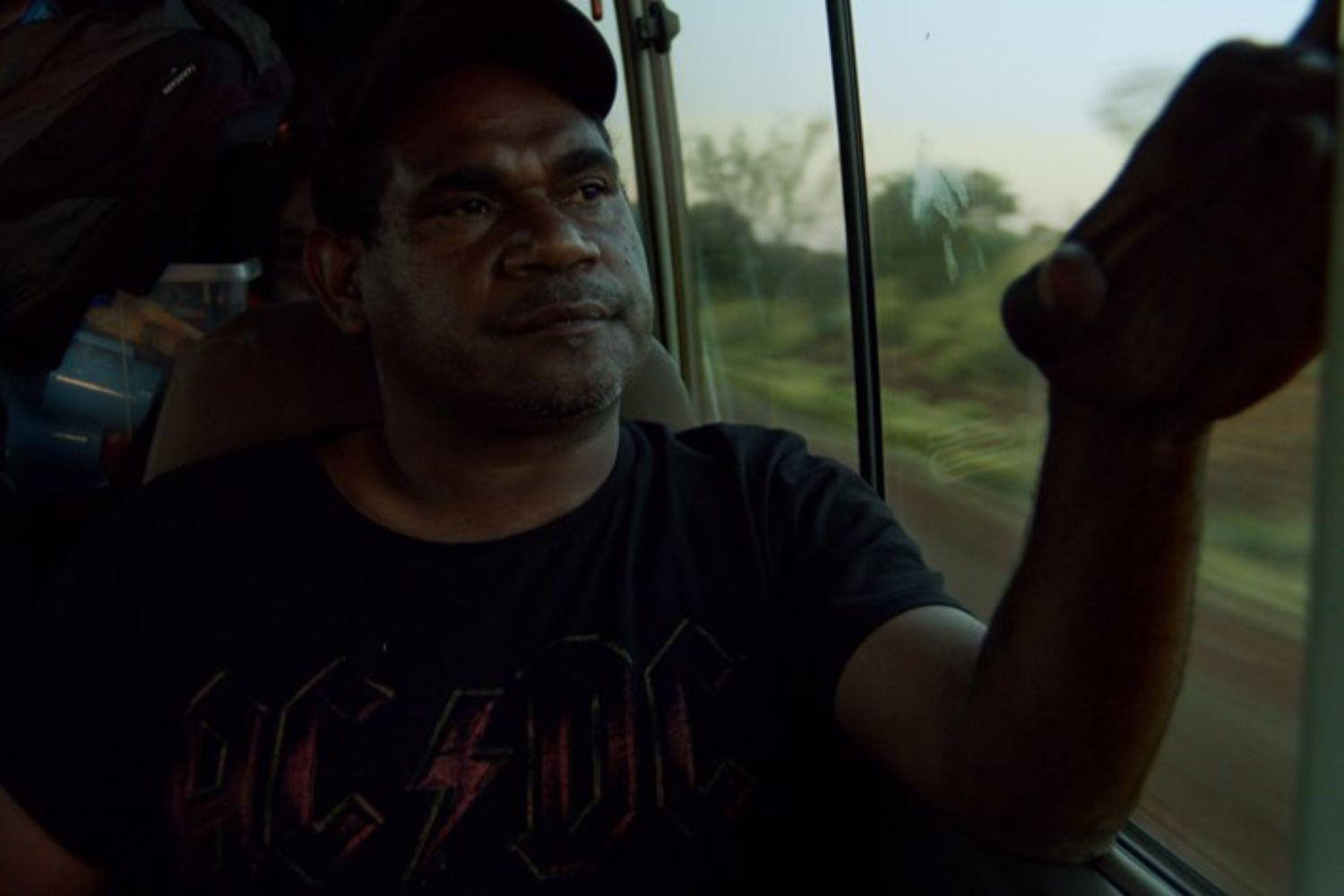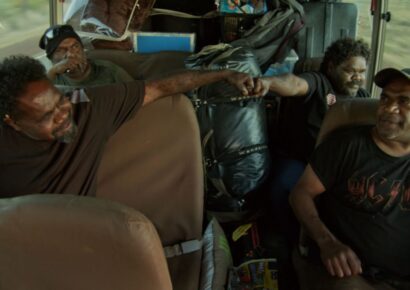Gravel Road documents the debut tour of Desert Stars, a rock band venturing into the most remote corners of the world.
What makes Rock ‘n Roll? It’s not just energetic performances and catchy melodies (although those things help), it’s about powerful messaging, making a statement and conveying meaning. Tristan Pemberton may have stumbled across Australia’s most impactful Rock ‘n Roll band – the Desert Stars who fuse Traditional Aboriginal Culture with Western Rock ‘n Roll.
Keep up with the latest Melbourne film and television news here.
The result? Gravel Road – an award winning feature length documentary that is the highlight of the First Nations program at this year’s St Kilda Film Festival. Directed by Pemberton, Gravel Road takes us on a journey across some of the most remote parts of Australia following the Desert Stars on their debut rock tour. We spoke to Pemberton to get an insight into the film and what it represents.
Premberton’s journey with the Spinifex people started over 10 years ago when his sister told him the story of the last nomads. She had heard stories about the Rictor Family; Australia’s (and possibly the world’s) last hunter-gather people to have contact with the modern world. Pemberton connected with the community and sought permission from them to help them tell that story through film. He has since made several films with the community including a music promo for the Desert Stars homelands tribute.
“It’s a song called Tjuntjuntjara. I met Jay (Minning) when I went out to Menzies Shire and together we and the band made that music promo. And then I heard the band were going on their first tour to support their album. It was going to be the first tour ever and they were travelling across the Western Desert into remote communities and remote places. I thought what a fantastic opportunity to capture a bit of history. So I sought permission to come out and everybody seemed pretty happy for me to come along with the camera. And so yeah, that’s. And that’s the short version of that story.”
Getting a team of people into the most remote places of Australia was only the first of many challenges in shooting the documentary. Getting to the first location took three days and included a car ride, four planes and another car ride at the other end and that’s just one way.
“It does present logistical challenges not only just physically having to travel there, but also you’ve got to get equipment there when you’re in remote places where there’s no power points, you have to make sure you’ve got plenty of batteries. Also there aren’t really very good roads across most of the Western Desert, hence the name of the film Gravel Road. We spent the vast majority of our time on gravel roads that were sometimes very corrugated, very difficult and it restricts how fast you can go.”
The title Gravel Road probably gives it away but when you think about a Rock ‘n Roll tour you think glitz and glamour, private jets and limousines but Pemberton and his team got to experience a different kind of tour and they are taking us along for the ride.
“I was there with them right from the first gig to the last gig on that leg of the tour. So yeah, I was on the bus. Most typically, stopping and camping on the side of the road in swags.
“That’s how it was most of the way we would drive until we couldn’t drive anymore. So all pile out, set up our swags, go to sleep, get up, do it all again.”
Normally you can’t beat the feeling of being out on the open road but car boredom and mishaps are to be expected and although these are elements within the tour Pemberton says there’s much more to it than that.
“Expect the unexpected. Really, it’s punishing on vehicles and It’s punishing on people. It’s in some ways very tedious because you’re spending a lot of your time just sitting in a vehicle looking out at the landscape with not much else to do but wait. If things can go wrong with vehicles, they can, and they did. I don’t want to give away too much.”
Through the highs and lows of the film one thing remains true, Jay savours the good in life. He has resilience enough for all and manages to help others gain perspective and quickly rebound from setbacks.
“I have to say Jay’s unwavering positive attitude was infectious and every time things seemed to be falling apart and I was getting stressed and the tour managers were getting stressed and then I would say to Jay, ‘how are you feeling?’ And he would say ‘I’m happy because I’m here and I’m doing what I love and if things don’t work out, that’s OK, at least we made it this far.’ It was quite an amazing experience sharing that with Jay.”
If you aren’t a Rock ‘n Roll fan this film is still a must see.
“The Spinifex people are arguably, probably the most traditional people left in Australia, or certainly you know collectively with Western Desert. There is something really real and raw about this story.
“Jay comes from a very, very long line of storytellers and he’s really got a unique story to tell. You won’t hear another story like this.”
So I think it’s a very special film about a very special group of people. I think by coming along and watching the film, you’ll learn something about what it means to be Australian and what it means to be a human being who lives on this earth.”
Catch Gravel Road and special live performances from Desert Stars and more on Saturday 10 June at the Hotel Esplanade, as part of the 2023 St Kilda Film Festival. Book now by heading here.
In partnership with St Kilda Film Festival

